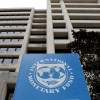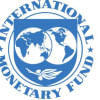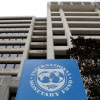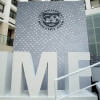IMF loan tranches: Agreement with IMF at last
The government has reached a staff-level agreement with the International Monetary Fund for the fourth and fifth tranche of the $4.7 billion loan programme, putting to bed months of uncertainty over their disbursement.
Besides, an additional $762 million was sought to navigate the "significant macroeconomic challenges", the IMF said in a statement yesterday.
The authorities reiterated their commitment to the objectives of the reform programme including fiscal reforms to address the emerging external financing gap, calibrating monetary policy to bring down inflation and fully implementing exchange rate reforms to enhance flexibility.
The disbursement of the two tranches, amounting to about $1.3 billion, and the request for a top-up of the loan amount are now awaiting approval by the IMF board.
The board approval is contingent on the completion of prior actions related to tax revenue mobilisation and full implementation of exchange rate reforms, said Chris Papageorgiou, the IMF mission chief for Bangladesh, in the statement.
"The authorities reiterated their commitment to the objectives of the reform programme including fiscal reforms to address the emerging external financing gap, calibrating monetary policy to bring down inflation and fully implementing exchange rate reforms to enhance flexibility," the statement said.
Key priorities include streamlining tax exemptions, enhancing tax compliance and delineating tax policy from administration, the IMF said, adding that a comprehensive approach is required in parallel to rein in subsidy expenditures in the electricity sector.
Steadfast implementation of the flexible new exchange rate regime will remain critical, the IMF added.
In the interest of maintaining Bangladesh's macroeconomic stability, both parties carefully reviewed all matters and reached an agreement on reforms related to revenue management, exchange rate policy and other structural areas, the finance ministry said in a statement yesterday.
The development is expected to unlock further foreign funding, with the government expecting to receive a total of $3.3 billion from various bilateral and multilateral lenders by June, The Daily Star has learnt from finance ministry officials informed with the proceedings.
Other than $1.3 billion from the IMF, Bangladesh is expecting to receive another $2 billion in budget support from various development partners including the World Bank, Asian Development Bank, Asian Infrastructure Investment Bank, Agence Française de Développement (AFD) and OPEC Fund for International Development.
The funds will further strengthen the country's foreign exchange reserves, which will help maintain stability in the exchange rate.
As of May 7, foreign currency reserves stood at $20.29 billion, according to data from the Bangladesh Bank.
"It is important to note that the reform programmes undertaken to receive budget support from development partners are entirely planned at the discretion of the government and are adopted in the national interest," the finance ministry said.
Under the new tax plan, the government has agreed to collect an additional Tk 30,000 crore in revenue in the next fiscal year under a new tax measure endorsed by the IMF.
They will raise the value-added tax on several products to the standard rate of 15 percent, cut back on tax holidays and withdraw various exemptions.
Initially, the IMF had recommended raising additional taxes equivalent to 0.9 percent of the national GDP.
But following a series of meetings, both sides settled on a lower target of 0.7 percent -- an estimated Tk 40,000 crore in additional taxes -- of which Tk 10,000 crore is expected to be collected through administrative measures.
Bangladesh is expected to receive $500 million in budget support from the WB among the $2 billion thanks to the government's move to dissolve the National Board of Revenue on the IMF's prescription.
Through an ordinance earlier this week, the interim government dissolved the NBR and replaced it with two distinct entities under the finance ministry: the revenue policy division and the revenue management division.
"It was not only the condition of the IMF, it was a condition of the WB too," said one of the finance ministry officials on the condition of anonymity as he is authorised to speak with the media.
The ADB is set to provide $900 million: $500 million for implementing banking sector reforms and $400 million for mitigating the impacts of climate change, they said.
In addition, the Asian Infrastructure Investment Bank would provide $400 million and AFD $100 million in co-financing initiatives with the ADB.
Besides, the OPEC Fund for International Development would provide a $100 million loan for strengthening economic management and governance.


 For all latest news, follow The Daily Star's Google News channel.
For all latest news, follow The Daily Star's Google News channel. 










Comments